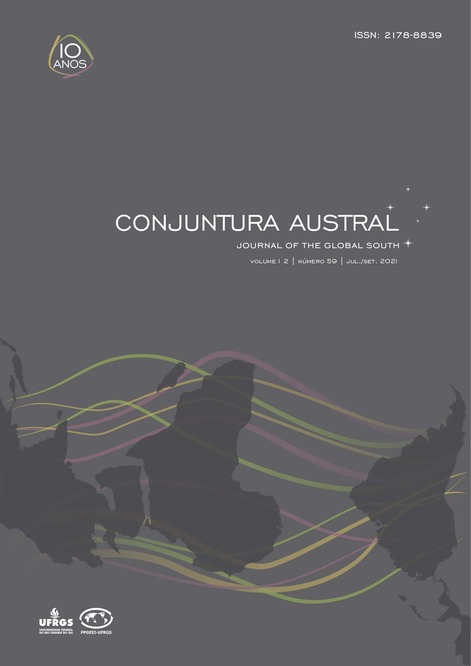Ver ítem
- xmlui.general.dspace_homeCentros e Institutos de InvestigaciónCIEP. Centro de Investigación en Economía y ProspectivaArtículos científicosxmlui.ArtifactBrowser.ItemViewer.trail
- Inicio
- Centros e Institutos de Investigación
- CIEP. Centro de Investigación en Economía y Prospectiva
- Artículos científicos
- Ver ítem
¿Dónde están las mujeres en la integración regional? Análisis y propuestas desde el MERCOSUR
Resumen
Este trabajo visibiliza las ausencias y muestra la riqueza del estudio desde prismas feministas para establecer una agenda de investigación integral de la integración regional en el MERCOSUR y que recupere el rol de las colectivas de mujeres y diversidades en la construcción de región a partir de su movilización, participación y reclamo. Se realiza un estudio de una selección de casos para identificar los movimientos contestación y participación de las
[ver mas...]
Este trabajo visibiliza las ausencias y muestra la riqueza del estudio desde prismas feministas para establecer una agenda de investigación integral de la integración regional en el MERCOSUR y que recupere el rol de las colectivas de mujeres y diversidades en la construcción de región a partir de su movilización, participación y reclamo. Se realiza un estudio de una selección de casos para identificar los movimientos contestación y participación de las mujeres en la construcción de región y la de visibilizar las ausencias de la literatura disponible. Para ello, este trabajo se divide en tres secciones. La primera presenta un breve estado de la cuestión sobre la incorporación de los feminismos en el campo de estudios de la integración regional y el regionalismo. Desde esta perspectiva incorporamos a los feminismos decoloniales como una estrategia para el abordaje de la agenda invisible de las mujeres. La segunda sección presenta una descripción de cómo el MERCOSUR ha incorporado (o no) políticas de géneros y analiza dos casos puntuales (agricultura familiar y educación). A partir de lo anterior, la tercera sección aborda, a modo de conclusión, una propuesta para el desarrollo de una agenda de investigación.
[Cerrar]
The objective of this work to make the absences visible and show the richness of the study from feminist lenses to establish a comprehensive research agenda of regional integration in MERCOSUR and that recovers the role of women's and diversities collectives in the construction of the region from of their mobilization, participation, and claim. A study of a selection of cases is carried out to identify the protest movements and participation of women in
[ver mas...]
The objective of this work to make the absences visible and show the richness of the study from feminist lenses to establish a comprehensive research agenda of regional integration in MERCOSUR and that recovers the role of women's and diversities collectives in the construction of the region from of their mobilization, participation, and claim. A study of a selection of cases is carried out to identify the protest movements and participation of women in the construction of the region and to make visible the absence of the available literature. For this, this work is divided into three sections. The first presents a brief state of the art on the incorporation of feminisms in the field of studies of regional integration and regionalism. We incorporate decolonial feminisms as a strategy to address the invisible agenda of women. The second section presents a description of how MERCOSUR has incorporated (or not) gender policies and analyzes two specific cases (that of family farming and that of education). Based on the above, the third section addresses, by way of conclusion, a proposal for the development of a research agenda.
[Cerrar]

Autor
Gonzalez, Leticia;
Perrotta, Daniela Vanesa;
Fuente
Revista Conjuntura Austral 12 (59) : 137-153 (jul/set. 2021)
Fecha
2021-09
Editorial
Universidade Federal do Rio Grande do Sul (UFRGS)
ISSN
2178-8839
Formato
pdf
Tipo de documento
artículo
Palabras Claves
Derechos de acceso
Abierto
 Excepto donde se diga explicitamente, este item se publica bajo la siguiente descripción: Creative Commons Attribution-NonCommercial-ShareAlike 2.5 Unported (CC BY-NC-SA 2.5)
Excepto donde se diga explicitamente, este item se publica bajo la siguiente descripción: Creative Commons Attribution-NonCommercial-ShareAlike 2.5 Unported (CC BY-NC-SA 2.5)


